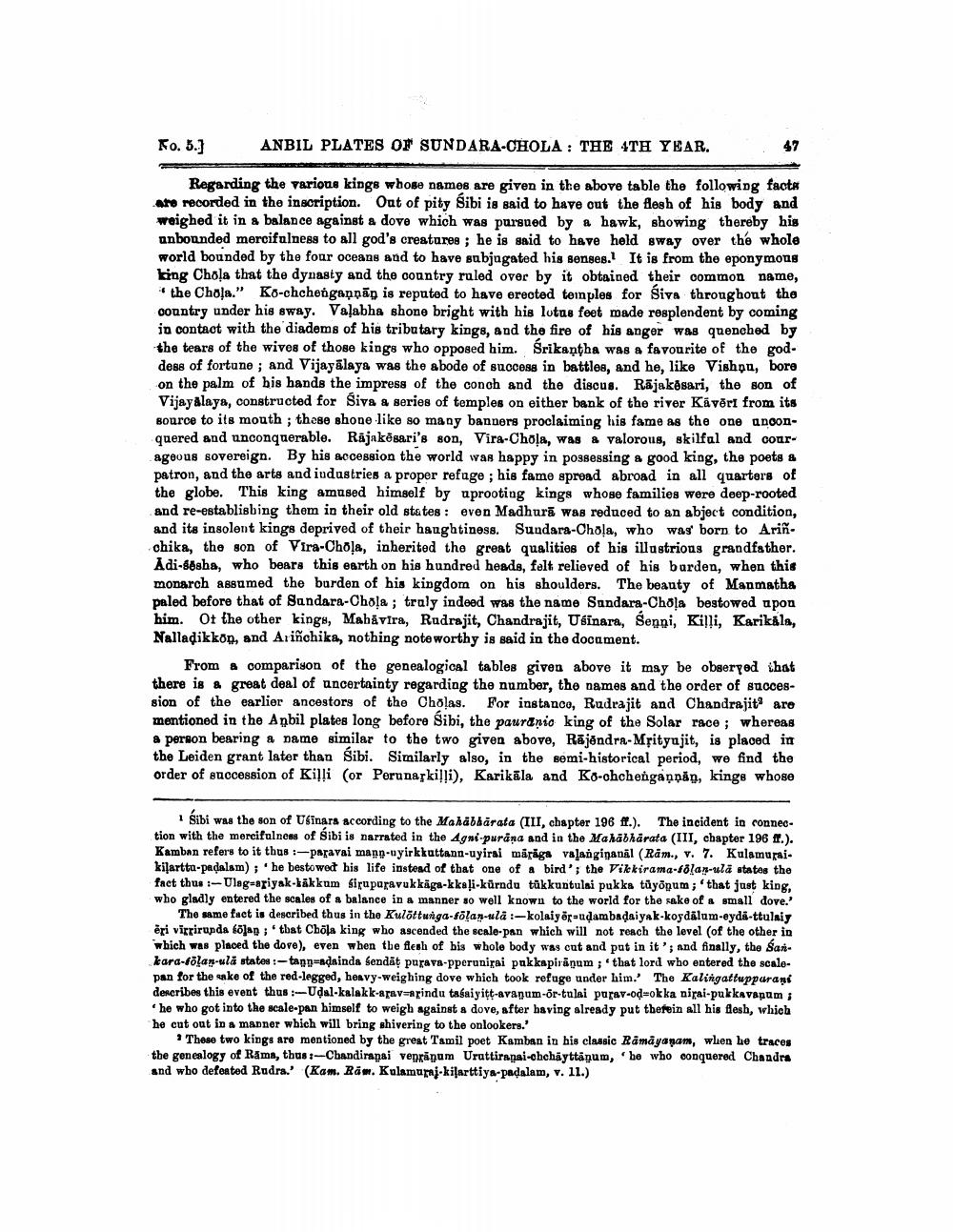________________
Ro. 5.]
ANBIL PLATES OF SUNDARA-CHOLA: THE 4TH YEAR.
47
Regarding the various kings whose names are given in the above table the following facta are recorded in the inscription. Out of pity Sibi is said to have out the flesh of his body and weighed it in a balance against a dove which was pursued by a hawk, showing thereby his anbounded mercifulness to all god's creatures ; he is said to have held sway over the whole world bounded by the four oceans and to have subjugated his senses. It is from the eponymous king Chola that the dynasty and the country ruled over by it obtained their common name,
the Chola." Ko-chchengannān is reputed to have erected temples for siva throughout the country under his sway. Valabha shone bright with his lutas feet made resplendent by coming in contact with the diadems of his tributary kings, and the fire of his anger was quenched by the tears of the wives of those kings who opposed him. Srikantha was a favourite of the god. dess of fortune ; and Vijayālaya was the abode of success in battles, and he, like Vishna, bore on the palm of his hands the impress of the conch and the discus. Rājakosari, the son of Vijayalaya, constructed for Siva a series of temples on either bank of the river Kávērt from its source to its mouth; these shone like so many banners proclaiming his fame as the one anoonquered and unconquerable. Räjakēsari's son, Vira-Chola, was & valorous, skilfal and coorageous sovereign. By his accession the world was happy in possessing a good king, the poets & patron, and the arts and industries a proper refage ; his fame spread abroad in all quarters of the globe. This king amused himself by aprooting kings whose families were deep-rooted and re-establishing them in their old states : even Madhurā was reduced to an abject condition, and its insolent kings deprived of their haughtiness. Sundara-Choļa, who was born to Ariñ. chika, the son of Vira-Chola, inherited the great qualities of his illustrious grandfather. Adi-80sha, who bears this earth on his hundred heads, felt relieved of his burden, when this monarch assumed the burden of his kingdom on his shoulders. The beauty of Manmatha paled before that of Sandara-Chola ; truly indeed was the name Sandara-Chola bestowed upon him. Ot the other king, Mahåvira, Rudrajit, Chandrajit, Ufinara, Senni, Killi, Karikala, Nalladikkon, and Ariñichika, nothing noteworthy is said in the document.
From a comparison of the genealogical tables given above it may be obseryed that there is a great deal of uncertainty regarding the number, the names and the order of succession of the earlier ancestors of the Cholas. For instance, Rudrajit and Chandrajit' are mentioned in the Anbil plates long before Sibi, the pauranio king of the Solar race; whereas a person bearing a name similar to the two given above, Rājöndra-Mrityujit, is placed in the Leiden grant later than Sibi. Similarly also, in the semi-historical period, we find the order of succession of Killi (or Perunaskilli), Karikāla and Ko-ohchengannag, kings whose
sibi was the son of Ufinara according to the Mahabharata (III, chapter 196 ff.). The incident in connection with the mercifulness of sibi is narrated in the Agni-purana and in the Mahabharata (III, chapter 196 1.). Kamban refers to it thus :-paravai mapp-uyirkkuttann-uyirai märäga valanginanil (Rám., V. 7. Kulamurai. kilartta-padalam); he bestowed his life instead of that one of a bird', the Vikkirama-18?ar-ulà states the fact thus :-Ulag-ariyak-kakkum siruparavukkaga-kkali-kürndu takkuntulai pukka täyõnum; that just king, who gladly entered the scales of a balance in a manner so well known to the world for the sake of a small dove.
The same fact is described thus in the Kulottunga-fölan-ula :-kolaiyöruudambadaiyak-koydälum-eyda-ttulaiy eri virrirupda folap ; that Chola king who ascended the scale-pan which will not reach the level (of the other in which was placed the dove), even when the flesh of his whole body was cut and put in it'; and finally, the San. kara-folay-ulā states :-tappadainda sendat purava-Pperunirai pakkapiranum ; that lord who entered the scalepan for the sake of the red-legged, heavy-weighing dove which took refuge under him.' The Kalingattuppurani describes this event thus Udal.kalakk-araw-agindu taśaiyitt-avanum-or-tulai purav-odwokka niral-pukkavapum
he who got into the scale-pan himself to weigh against a dove, after having already put therein all his flesh, which he cut out in a manner which will bring shivering to the onlookers.
These two kings are mentioned by the great Tamil poet Kamban in his classic Ramayanam, when he traces the genealogy of Rama, thus:--Chandiranai veprānum Uruttiranai-obchäyttänum, be who conquered Chandra and who defontod Rudra.' (Kam. Rám. Kulamuraj-kisarttiya-padalam, v. 11.)




